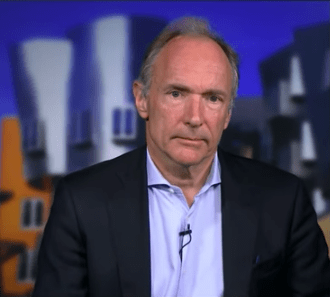The Creator of the World Wide Web Is ‘Devastated’ by What It Has Become
Tim Berners-Lee is fighting for a freer, more open internet. Tim Berners-Lee (Screenshot / YouTube).
Tim Berners-Lee (Screenshot / YouTube).
Tim Berners-Lee isn’t a household name like Steve Jobs, Bill Gates or Mark Zuckerberg. He is, however, the inventor of a tool that has dramatically remade the way the world communicates, shares information, even lives. In 1989, Berners-Lee created what became the World Wide Web, releasing the code for free. Now, after multiple privacy scandals involving Facebook and Twitter, and especially after revelations of how Russian hackers used Facebook to attempt to influence the 2016 U.S. election, Berners-Lee is redoubling his efforts to save the internet, as he explains in a newly published interview with Vanity Fair.
He has, as the article observes, “never directly profited off his invention” and “spent most of his life trying to guard it.” He always knew that his creation could fall into the wrong hands, but the web’s role in the 2016 election shocked him. “I was devastated,” Berners-Lee told writer Katrina Brooker. “Actually, physically—my mind and body were in a different state.”
He had spent years advocating for a free and open internet but consolidated his efforts in 2009, starting the World Wide Web Foundation to, as explained on the organization’s site, “advance the open web as a public good and a basic right.”
The World Wide Web Foundation was instrumental in the fight for “net neutrality,” bridging the gender gap in internet access for women in Mexico and India, supporting Ugandans suing their government over a tax on the use of social media, and, most critically, funding research to examine how Facebook’s algorithms determine what kind of information its users are exposed to. Those algorithms, as the world learned in 2016, had political consequences.
As CNN’s Brian Stelter wrote in March, congressional investigators, lawyers and other analysts examining Facebook’s impact on the 2016 election found a “pipeline of Russian propaganda. A so-called troll farm hijacked Facebook’s platform to sow chaos and, eventually, to try to tip the scale in Donald Trump’s direction.”
A New York Times/Observer investigation found Facebook had sold user data to the voter-profiling company Cambridge Analytica, which had close ties to the Trump campaign.
“Looking at the ways algorithms are feeding people news and looking at accountability for the algorithms—all of that is really important for the open Web,” Berners-Lee said.
To achieve his goal of accountability, Berners-Lee is also focused on building Solid, a project housed at MIT that, Vanity Fair explains, aims to “re-decentralize the Web.” The platform is designed to “give individuals, rather than corporations, control of their own data.”
The idea is still in its infancy, but if Berners-Lee and his team can turn it into reality it will have potential to democratize the web:
The system aims to give users a platform by which they can control access to the data and content they generate on the web. This way, users can choose how that data gets used rather than, say, Facebook and Google doing with it as they please. Solid’s code and technology is open to all—anyone with access to the internet can come into its chat room and start coding.
Berners-Lee’s vision of an internet controlled by people, rather than by massive corporations, is a tall order in the age of Google and Facebook. These tech giants may be, as Vanity Fair says, “chastened by bad press and public outrage,” but as long as their behavior, however abhorrent to many, is both legal and lucrative, it’s hard to see an opening for legislative action. Still, Berners-Lee is trying.
As for what the average, non-tech-savvy person can do, he ends his Vanity Fair interview with the following advice: “You don’t have to have any coding skills. You just have to have a heart to decide enough is enough. Get out your Magic Marker and your signboard and your broomstick. And go out on the streets.”
Your support matters…Independent journalism is under threat and overshadowed by heavily funded mainstream media.
You can help level the playing field. Become a member.
Your tax-deductible contribution keeps us digging beneath the headlines to give you thought-provoking, investigative reporting and analysis that unearths what's really happening- without compromise.
Give today to support our courageous, independent journalists.






You need to be a supporter to comment.
There are currently no responses to this article.
Be the first to respond.